|
Topics
Over
the years, what have parents talked to me about? Probably
everything and anything you can think of.
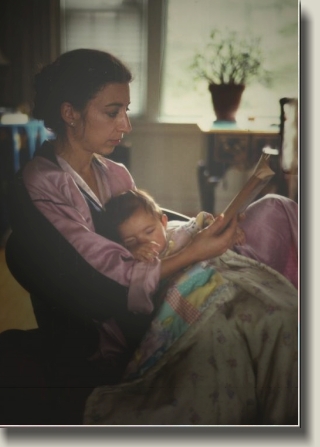 As a
mom, teacher, and educator, I'm able to bring over 40 years of
professional experience to our talks - to help you and your child. As a
mom, teacher, and educator, I'm able to bring over 40 years of
professional experience to our talks - to help you and your child.
On
a confidential basis, I'm ready to answer your questions and give you
sensible, practical tips and advice that you can immediately use with
your child.
I'm
used to talking to mothers and fathers who are very competent in their
personal and professional lives but are fairly new to
parenting.
I
respect parents who want targeted and timely advice to
avoid mistakes, maximize their children's potential in the
first
five years,
and help their children grow up well.
The parents I talk to
have "lucky children." Their children are truly
wanted and loved -
and their parents, although quite busy, are motivated to get
really good
advice. The sooner, the better.
So feel free to tell me about you, your family, and
your child. And feel free to ask me about anything. For
instance
(in alphabetical order) -
Age-appropriate Expectations
The
first five years are an amazing time, and your child has tremendous
potential to learn so much. While you no doubt know what to
expect in your workplace, if you are a first-time parent you need to
know what's reasonable to expect in your home. So ask, and
I'll
give you information and advice - with you and your child in mind.
Age-appropriate Learning
Activities
There
are hundreds of opportunities each day to provide your child with
enjoyable and educational activities - many take only moments or
minutes to do, but they add up to happy memories and a great many
acquired skills. Let's talk about how to make the most of the
time you do have with your young child and how to make sure that the
other adults in your child's life also contribute what they can to your
child's intelligence, competency, school readiness, and school success.
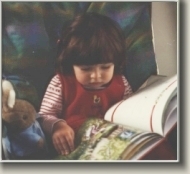 Books and Children's Literacy Books and Children's Literacy
We
can talk about how children learn to read. And I'll give you specific,
easy-to-do ideas to help your toddler or pre-schooler love reading and
be an early reader. Having helped hundreds of young
children learn to read, it's my joy to share how to do this with you.
This is one of the biggest "gifts" you can give your child -
with
enormous and wonderful implications for your child's future school
success. I encourage you to talk to me about this.
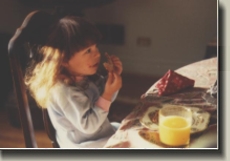 Breastfeeding and Food Breastfeeding and Food
You
know how important it is to make good choices for your child. But
if you're like many parents,
you may need some ideas and
support. We
can talk about your child's eating patterns, your preferences, common
pitfalls, and better alternatives. This can include ideas for
fast, simple, child-friendly and nutritious meals and snacks.
And
this can include ideas for handling "picky eaters," children who don't
sit
still at mealtimes, children who eat while they play, and children who
are at risk of developing unhealthy eating patterns.
Bribes
and Rewards
Whether
you are a working parent tempted to bring your child a "treat" at the
end of your work day, or you're toying with the idea of toilet-training
your child with "gold stars" or "M&Ms" as a reward, or you are
promising your child a special gift if your child behaves a certain
way, or you are considering giving your child an allowance in exchange
for helping with simple household chores - we should talk.
Challenging
Behaviors
Every
child has his or her own personality, and every child goes through
important and necessary stages of development. We can talk
about what your
child does when he or she is frustrated, tired, bored, or scared - and
how you can respond and help your child deal with daily situations to
minimize or eliminate whining, shouting, crying, defiance, tantrums,
biting, hitting, or other unpleasant or unproductive behaviors.
Child
Care and Education
Parents
are faced with many choices - choosing a nanny, parent-child program,
child care program, nursery school, enrichment activities, and then
elementary school. These are major decisions you need to make which
will have major consequences. We can talk about the pros and
cons
given
your family's needs and values, your child's age and temperament, and
the child care/educational options available to you. And we
can
talk about how to best evaluate any option you are considering or have
selected.
Diapers
and Toilet Training
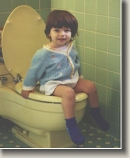 I've
personally helped toilet train over a hundred children - and I've given
toilet-training tips to many hundreds of
parents who didn't know how and
when to begin or what to do - and who were thrilled with the advice.
Even if you have an infant, it's worth knowing what to do - and what
not to do - to lay the groundwork and make it easy when the
time
is right. So call
"early." And if you've already started, but it's not going
smoothly, please talk to me for advice that works. I've
personally helped toilet train over a hundred children - and I've given
toilet-training tips to many hundreds of
parents who didn't know how and
when to begin or what to do - and who were thrilled with the advice.
Even if you have an infant, it's worth knowing what to do - and what
not to do - to lay the groundwork and make it easy when the
time
is right. So call
"early." And if you've already started, but it's not going
smoothly, please talk to me for advice that works.
Home-Schooling
Many
parents choose home-schooling for religious reasons.
Others
for academic reasons. Either way, we can talk about the pros
and
cons of home-schooling and how to make it work for you and your child.
Language
Skills
Your
child will learn to talk even if you do almost "nothing." But
the
more language skills your child has, the easier it will be for your
child to understand words, requests, directions, conversations,
situations, and concepts. And the more language skills your
child
has, the easier it will be for your child to cooperate, make friends,
explain things to you, get his or her needs met, read, write, and
learn. So let's talk about language development and, if
appropriate, raising a bilingual child.
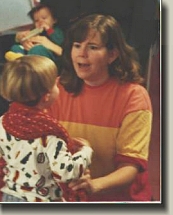 Limit-setting
and Discipline Limit-setting
and Discipline
No
matter what your style of parenting, virtually every parent needs to
know how to set simple, understandable, and age-appropriate limits -
and to follow though without feeling guilt. Really good
parents
benefit from talking through situations and getting ideas to try with
their children.
Manners
and Social Skills
Children
are not born knowing how to behave, and good parents gently help their
children learn how to behave within their family and with other adults
and children. This starts at an early age, and we can talk about
reasonable expectations and how to help your child gain important
social skills and confidence. We can also talk through any
problems your child is having when playing with other children or
responding to you.
 Naps
and Sleep
Children
(and parents) are different. And there is no one right way to
approach naps and sleep. That said, there are some things
that
everyone can agree on. We can talk about what routines and
reactions contribute to and greatly increase the chance that
your
child will go to sleep without elaborate and protracted "protests and
requests." We can also talk about ways to help your child
stay in
- and sleep in - his or her own crib or bed, if that's what you want.
Naps
and Sleep
Children
(and parents) are different. And there is no one right way to
approach naps and sleep. That said, there are some things
that
everyone can agree on. We can talk about what routines and
reactions contribute to and greatly increase the chance that
your
child will go to sleep without elaborate and protracted "protests and
requests." We can also talk about ways to help your child
stay in
- and sleep in - his or her own crib or bed, if that's what you want.
New
Baby
Whether
you're thinking about having a new baby, expecting, or have just had a
new baby, there is so much to talk about. And if the new baby
is
a second child, there's probably a lot on your mind about how to help
your first-born and how to handle everything well. We can
talk about
this, too.
New
School
Starting
school is a major milestone in every child's life, and parents can say
and do a variety of things to help prepare their child for a successful
and happy start. Whether the new school is a nursery school,
a
child care program, or kindergarten, I can give you specific
age-appropriate suggestions for "getting ready." I can also
help
you problem-solve if your child has started a new school and it hasn't
gone as smoothly as you'd like.
Numbers
and Math Concepts
Many parents give little
thought to math skills beyond teaching their
young children to count from 1 to 10. And their children
invariably enter kindergarten unprepared and frustrated with
this basic subject - rather than feeling confident and
competent. We can talk about the many free and simple
opportunities that exist each day for you to help your
child become familiar (and successful) with numbers
and math
concepts - while playing with toys, reading books, eating, doing
household chores, grocery shopping, you name it.
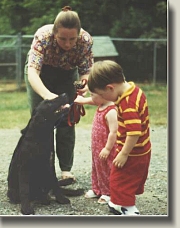 Pets Pets
Sometimes
it's a happy mix, and sometimes it's not. If you're considering getting
a pet and your child is very young, there are some things to know
before you go ahead. If you already have one or more pets,
you
may want to talk through your child's reactions and behaviors and get
ideas for handling problematic situations.
Public
vs. Private School
Financially
or geographically, you may not have a choice. But if you do,
you
and your spouse might want to consider what each public school
and
private school has to offer and then reach some kind of agreement.
To make an educated decision, it's important to consider your
child, your family's values and priorities, and the very real
differences between the school situations you are considering.
I
can give you specific suggestions from my decades in the education
field which have included visiting and evaluating a considerable number
of elementary school options (including public schools, private
schools, and home-schooling situations). If you're already
sure
that private school is what you want, let's talk about the admission
process (the sooner the better). If, on the other hand,
you're
leaning toward public school even though you could do a private school,
you might want to talk through your reasons and get a "second
opinion" to either confirm your thinking or get additional ideas to
consider.
Quality
Time
Is
there such a thing? Yes. But can it be accomplished
in "20
minutes a day?" No, just like there's no such thing as "no
maintenance gardening." Given the importance of the early
years,
we can discuss what constitutes quality
time
so you can make the best use of the time you have with your child and
make the best choices for how your child spends time with others.
Real
and Pretend
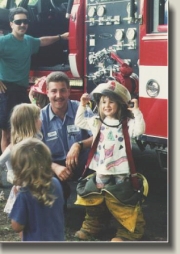 Growing
up involves learning more and more about the "real" world.
One
way that young children master real-world behaviors and
concepts (and gain mastery over their very real feelings) is
to
practice and, sometimes, to pretend. Whether it's dress-up,
dolls, superheroes, imaginary friends, or monsters under the bed; many
children need encouragement, understanding, and timely help to
distinguish real
from pretend
(and safe
from scary)
- before Halloween arrives and throughout their early years.
Routines
and Rituals Growing
up involves learning more and more about the "real" world.
One
way that young children master real-world behaviors and
concepts (and gain mastery over their very real feelings) is
to
practice and, sometimes, to pretend. Whether it's dress-up,
dolls, superheroes, imaginary friends, or monsters under the bed; many
children need encouragement, understanding, and timely help to
distinguish real
from pretend
(and safe
from scary)
- before Halloween arrives and throughout their early years.
Routines
and Rituals
Every
day brings challenges and includes the unexpected - a phone call when
you're sitting down to dinner, a sick child when you need to go to
work, or a child's "lost" shoe when you're about to leave the
house. It's hard or even impossible for parents with young
children to keep to an exact schedule, and that's completely
understandable. That said, establishing (and maintaining as
much
as possible) daily routines and rituals will greatly help you and your
child. We can talk about age-appropriate routines and
rituals
(for mornings, meals, play-times, toy clean-up times, nap times, bed
times, etc.) to give your child a sense of security, encourage
cooperation, and save you time and trouble.
Safety
at Home
Many
(preventable) accidents happen at home - some serious, some not.
And even if the accidents aren't serious, everyone still feels
terrible when they happen. We can talk about the
range of
essential "environmental" changes you can make in your home and the
degree and type of supervision needed for different ages and
situations. We can also talk about how you can teach your
child
to be relaxed but safety-conscious (with toys, stairs, furniture, food,
and in the kitchen, bathroom, etc.). My suggestions will help
your child be safer at home and make your life easier as well.
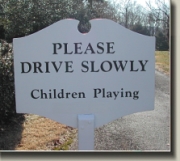 Safety
Outside Safety
Outside
Whether
it's when your child is walking on sidewalks, crossing
streets, in a
playground, in a store, near a swimming pool, or in a garden;
I can give
you suggestions for increasing your child's safety and decreasing
preventable accidents.
Selecting
Quality Children's Books
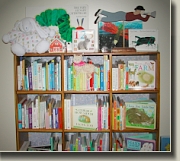 There
are an extraordinary number of books available for each age group.
But all books are not created equal; some are really poor
choices. With thousands of children's books published each
year
and limited time each day to read, how do you choose? Please let me
make specific suggestions. I will give you more than
a
list of titles. I will tell you what to
look for and
what to avoid. This will maximize the quality of the time you
spend reading with your child and provide a far more enjoyable and
educational experience - with lasting results. There
are an extraordinary number of books available for each age group.
But all books are not created equal; some are really poor
choices. With thousands of children's books published each
year
and limited time each day to read, how do you choose? Please let me
make specific suggestions. I will give you more than
a
list of titles. I will tell you what to
look for and
what to avoid. This will maximize the quality of the time you
spend reading with your child and provide a far more enjoyable and
educational experience - with lasting results.
Selecting
Quality Toys
and Educational Materials
Toys
cost. Toys clutter. And, too often, a child quickly
loses
interest in toys that parents bought with the best of intentions.
With thousands of toys on the market (including toys of
questionable safety, value, and values), you need to make wise choices.
I can make suggestions for the types of toys and educational
materials which provide not only enjoyable playtimes but real
opportunities for learning and for on-going, multi-year interest and
use.
Self-Help
Skills
While
young children are clearly dependent on adults for a great many things,
they are also quite capable of helping you, helping themselves, and
acquiring many important skills in the process. Let's talk
about
what toddlers, twos, threes, and fours can do each day to help out,
become competent, and feel proud of themselves. You can give
your
child important skills and self-confidence (and do yourself a big
favor, too!).
Separation
and Attachment
This
is a subject close to my heart. I've personally helped
hundreds
of parents and hundreds of very young children handle time apart,
including saying goodbyes without parents "sneaking away" or children
clinging or crying. In my experience, talking about your
feelings in advance and making a plan before the event happens can be a
great help. And getting specific, age-appropriate ideas for
things to do and things to not
do is very useful.
Television/Movies/Computer
Games
Parents
are increasingly letting their young children watch all kinds of
television programs, commercials, and movies as well as letting their
young children play video games and use all sorts of computer software.
We can talk about the implications of all these
media
choices and the pros and cons for different ages and children.
And we can talk about what patterns and expectations
are
being reinforced, what your child is learning, and what your child is not learning.
What's
"Normal?"
Almost every parent asks
this or wants to ask this. I've got a lot
of experience with young children, and our telephone sessions are
completely confidential. So feel free to describe your
child's
behavior or skill level or situation - and ask me what I have seen and
what I think. Chances are that I can give you reassurance and useful
information about whatever is causing you concern.
Writing
and Artwork
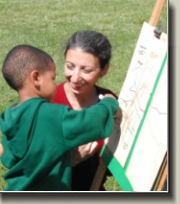 Research
shows that there is a direct link between children who read well and
children who write well - and that children's early artwork and early
"writing" skills contribute in important ways to school readiness and
school success. Please let me share some easy, proven ways to
support your child's creative development, language skills, and
emerging writing abilities. Research
shows that there is a direct link between children who read well and
children who write well - and that children's early artwork and early
"writing" skills contribute in important ways to school readiness and
school success. Please let me share some easy, proven ways to
support your child's creative development, language skills, and
emerging writing abilities.
_________________________________________
Whatever Else You Want
I've listed a lot of
topics - from A
to (almost) Z.
If there's another parenting topic that interests
you, please mention it to me and we can talk about it.

Fees |

Background |

Contact |

Main |
|